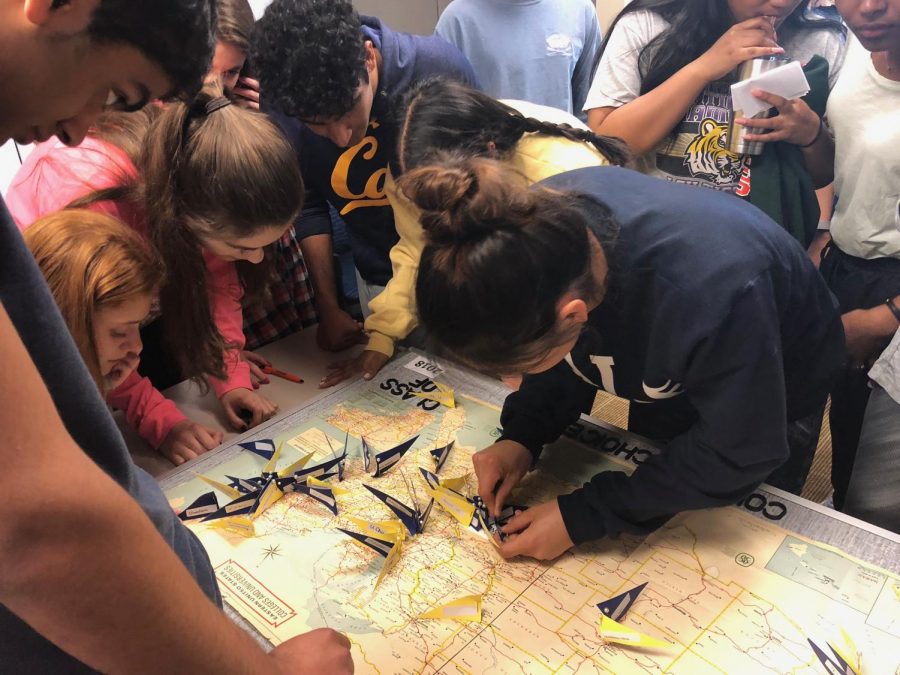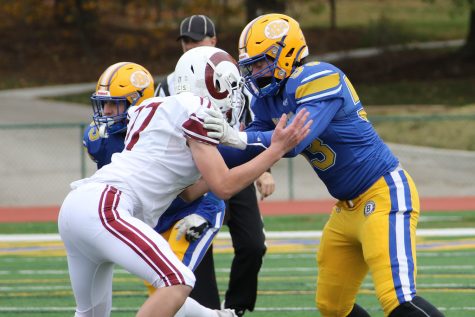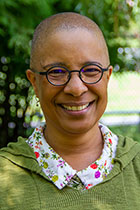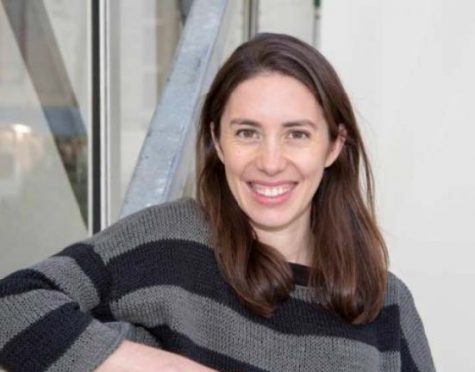Students Reflect on the College Process
A student brings their entire family around a laptop, camera ready. On the count of three, an email is opened. They got into their dream school. And just like that, the most important decision in a person’s life is made. Right?
The image of college acceptance and decisions is far more complicated than a single moment. An anonymous senior recounts one such complicated memory, “I was on a roadtrip to Johns Hopkins when I got the rejection email…from Johns Hopkins.”
After talking to a dozen Burroughs’ Seniors about the college decision process, students applied to, on average, 15 schools. Some students fall higher or lower on that number, with Olivia Benoit ‘18 applying to 24 schools.
She says, “I am happy I applied to a lot of schools because it provided me with a lot of choices and gave me some flexibility. It was a huge amount of work, but absolutely worth it.”
The college decision process varies for students who apply Early Decision (ED), since acceptance with this plan binds a student to that school.
A handful of Burroughs seniors took this route. Rachel Martin ‘18 (who will be attending Boston University ‘22) applied ED “because I realized that even if I got into all of the schools I applied to, BU would still be my number 1 choice.”
While Martin heard back in February, Rachel Sorenson ‘18 knew by November that she would be attending St. Lawrence University. When she visited the University before applying, “it just clicked, and I knew that is the place I want to spend the next four years of my life.”
Many seniors acknowledge the importance of college visits. William Howlett ‘18 (Stanford University ‘22), went on about 20 visits during the summer after sophomore year and during junior year. He made sure to visit all the colleges he applied to before applying.
On the other hand, Jack Case ‘18 (Colorado State University ‘22) decided to visit 4 of the colleges he was accepted into only after being accepted.
Many seniors noted the importance of observing student and campus life. As Martin says, “Some schools I thought I would really like, but as soon as I stepped on campus, it wouldn’t be a good fit for me.”
Hunter Sigmund ‘18 (University of North Carolina ‘22) had a similar experience, when “One of my schools was super strong academically and looked great on the website and in college books, but when I visited, I realized that it wasn’t the school for me because of the lack of student social activity on campus. There were like no people outside walking around, and it was a Friday and 75 degrees outside. That threw me off, and I didn’t want to go to a school where there was little student life on campus.”
Each senior had various factors that weighed into their final decision. Many students mentioned the importance of academic rigor, active student body, and what Benoit denotes as the “overall vibe of the school.” While many included location in their list of important factors, Benoit says she “could go anywhere in the country or in the world and be happy and successful. I applied to schools 5 miles from home and 5000 miles from home.”
Yet another part of the college application process, in general, is the choice to share your experiences with your peers. Students ranged from Phoebe Sklansky (Colgate ‘22), who preferred not to talk about applications during the process, to Sigmund, who chose to open up to a small group of friends, to Martin, who described herself as “super open” during the process. Why the stigma around it? Benoit explains, “At first, it was all kept very secretive and it was taboo to discuss where you or others were considering. But as the process continued, especially as we received decisions, students were much more open with each other.
Everyone was feeling the same way — anxious, disappointed, ecstatic — and it became almost necessary to share these feelings.”
After making their decisions, most seniors have updated social media profiles and tried to reach out to future classmates. Sorenson has found a roommate, while Sigmund has started looking at housing options and course enrollment for UNC’s Honors Program, to which he has been accepted.
While the seniors find themselves planning for next fall, the summer season approaches. How have seniors decided to spend their last summer before college? Dahlia Haddad ‘18 says she “was more interested in making some money for next year than I was in finding an internship” and will be spending the summer working camps and babysitting.
On the other hand, Sklansky will be occupied with a political internship and a job as a summer camp counselor. The common theme of saving up before college carries through many seniors’ summer plans. Sigmund will be lifeguarding and dive coaching but says he is also trying to “go on a lot of trips with my friends to take advantage of our last summer.”
Other students focused more on the relaxation aspect. Benoit notes that she has “worked hard for four straight years and four straight summers, so I want to take it easy the summer before I’m on my own.” She plans to travel to Europe and spend time with her friends. She says, “I want to soak up every last thing about living in St. Louis because I probably won’t come back.”
Case shares a similar insight, as he quit his job and says he wants “to make my last summer before college (possibly my last one in STL) random and fun and one to splurge on.”
When asked for feedback from their application process, multiple seniors wished the timeline was elongated. Howlett suggests starting applications earlier since he and many applying to a lot of schools found the essay timeline “unrealistic.”
Others were more direct in their worries regarding the application process.
Sigmund believes that “Burroughs isn’t very healthy when it comes to college.
It’s a huge source of stress because of the competitive environment.” He suggests a month in English class dedicated to essay writing. He maintains, “the college counselors have to read so many essays that they can’t give detailed feedback to everyone on every essay.”
A final request was simpler. Case says that “Burroughs’ College Counseling team does a really great job of helping you when you need to be helped, but I felt like I could have benefited from more explanation at times.… I didn’t know about interviews until it was too late to request any. Something as simple as a printed list of all the things and minute details you might need to know during the process could be helpful and informative for the inexperienced applicant such as myself.”
As for advice for the current junior class, seniors had many ideas. Both Howlett and Case stress the importance of deadlines. Howlett suggested starting applications during the summer, while Case suggested working 10 minutes or writing a paragraph every night.
Other than managing time wisely, the main piece of advice was, as Nathan Tung ‘18 said, “don’t care too much” and be ready for rejection. Jason Kemp ‘18 advises juniors not to get too attached to one place: “It’s gonna hurt.”
Another anonymous senior pointed out how unpredictable the selection process is. They say, “I haven’t gotten even a single A- at Burroughs, but I still got rejected from five or so schools. Work hard on your essays, but the rest is entirely out of your control.”
Kemp reinforced this point, laughing as he mentioned that “at the end of the day, it’s random.” He points to the fact that one of his friends got into University of Southern California, while Kemp did not even though Kemp “wanted USC more than he did.”
The situation was flipped for New York University, Kemp was accepted and this same friend was not. He also advises not keeping oneself to the “Burroughs standard” which regards some strong, well-regarded schools as “safeties.”
Five minutes later, when Kemp finished telling me the horrors of the college application process and my impending doom, Ian Sajjapong ‘18, sitting next to Kemp, shrugged and said, “everyone will give you advice that contradicts someone else’s.”
Interview adjacent, a group of juniors picks up on the conversation topic and starts discussing how disillusioned they already are with the process that awaits them. They’ve spent all spring break going on college visits, and according to one junior, “the only thing that varies is location.” Regarding these comments, Kemp says, “you don’t know anything. You figure everything out after it happens.”
Benoit agrees that the college application process is “horrifically screwed up, entirely unpredictable, and, often, tremendously frustrating.” However, she also notes that “colleges have no incentive to [change the system] because the ‘mystery’ of the whole process leads to single-digit acceptance rates and larger endowments.”
Finally, Haddad believes that, because of the unpredictability of college applications, applicants shouldn’t let their extracurricular life revolve around resume-boosting activities “because in the end those choices may or may not make a difference, and you want to be able to look back at high school and say that you did what you loved. Why trade these four years for the next four years?”







